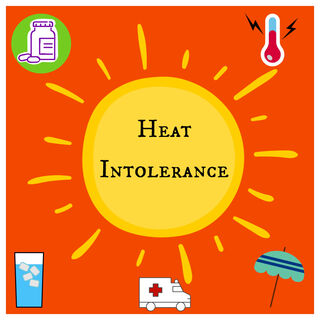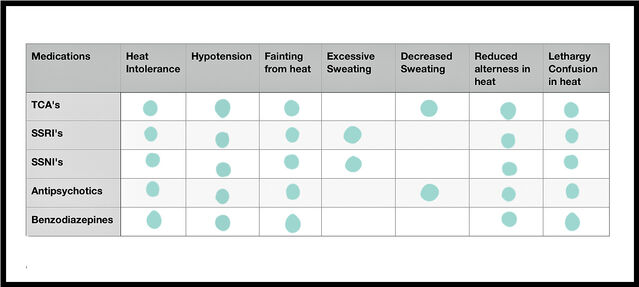Psychiatry
Heat Intolerance and Psychiatric Medications
Learn how to stay cool in the heat.
Posted July 27, 2021 Reviewed by Kaja Perina
Key points
- Though 1 in 6 Americans take psychiatric medications, many aren't aware of the need to be mindful of the heat in summer months.
- Some psychiatric medications increase sweating, while others impair sweat production.
- Some medications slow blood pressure (hypotension), while others impair cognitive functioning in extreme heat.
- It is imperative to know the signs of heat exhaustion.

Though 1 in 6 Americans take psychiatric medications, many aren't aware of the need to be mindful of the heat in summer months. Medications like Serotonin Reuptake Inhibitors (SSRIs), Serotonin Norepinephrine Reuptake Inhibitors (SNRIs) Tricyclic Antidepressants (TCAs), Antipsychotic Drugs (ACDs), drugs that help reduce anxiety like benzodiazepines and other medications can interfere with the activity of the hypothalamus - a part of the brain that helps regulate temperature, heart rate, blood pressure and thirst.
As a result, children and adults who take psychiatric medication are prone to a variety of heat related symptoms. Some psychiatric medications increase sweating, while others impair sweat production. Some medications slow blood pressure (hypotension), while others impair cognitive functioning in extreme heat. Some medications promote thirst, while others inhibit it, interfering with hydration. Furthermore, many medications make the sweltering heat of summer feel exponentially hotter.
Medication and Thermoregulation
Thermoregulation is a neurobiological network of endocrine, central nervous system, autonomic and somatosensory responses that controls our body temperature, among other things. What's important here is to understand while psychiatric medications offer a reduction in anxiety, depression, and other mental illness symptoms, they can meddle with our thermoregulation.
Table 1 shows some medications and their heat related symptoms.

Essentially, medications can interfere with hypothalamic-set body temperature, impede the thermoreceptors (nerve endings that detect temperature on our skin and skeletal muscles), and reduce or accelerate sweat production. What's interesting about thermoregulation and psychiatric medications is that many of these body temperature issues go unnoticed during winter and become apparent only in the heat of summer.
Tips for Dealing with Heat Intolerance
- Know your meds. Make sure you know what kinds of medications you're taking - and if they lead to Antidepressant-Induced Excessive Sweating, for example, or reduced sweat production, impaired thirst or or other heat related issues.
- Hydrate. I'm prone to extreme heat intolerance with the medication I take for my depression, so on MOST summer days I carry a water bottle with me. During very hot days, I'll be drinking iced water, even freezing an extra water bottle or two if I'm out and about. Staying hydrated will be easy if you notice you sweat or are thirsty. But if your medication leaves you dry and not looking for water, make sure you drink throughout the day even if you're NOT thirsty.
- Stay cool. When you take psychotropic medication, learn to stay cool by limiting outdoor activities to the morning or evening. Or finding shade or an umbrella for added relief if you have to be out in the afternoon. Buy clothing that wicks away sweat or use cooling accessories that help beat the heat. If it's sweltering out, rethink your plans and consider seeking refuge in air-conditioning.
- Know the signs of heat exhaustion. This mild heat-related illness can develop after several hours or even days of exposure to high temperatures, by inadequate or unbalanced replacement of fluids. Signs include headache, racing pulse, dizziness, nausea, muscle cramps, fainting, fatigue or rapid breathing. Lie down in a cool room with your feet above your heart. Apply wet ice packs to your chest area, and other places you feel hot. Sip a half-cup of a water or a sports drink every 15 minutes.
- Know the signs of heat exhaustion. Heat stroke is the most serious heat-related illness. It occurs when the body is unable to control its own temperature - and can be life threatening. Symptoms include temperature of 103 or higher, pressured breathing, confusion, dizziness, nausea, vomiting, loss of consciousness, blurry vision, high rapid pulse, throbbing headache, red, hot skin. Immediately hydrate and cool body temperature down with ice or cold packs. Call 911 or go to the emergency room immediately.
Living with a mental health issues requires us to discover ways to live well in spite of our illness. For some of us, it will include managing the risks and benefits of taking medication. Don't let the heat overwhelm your life if you take medication. Heat intolerance can be managed.


